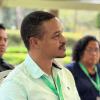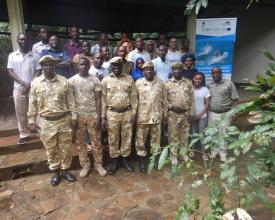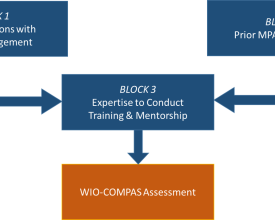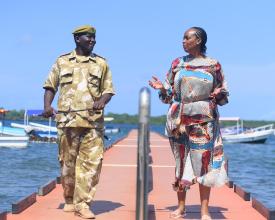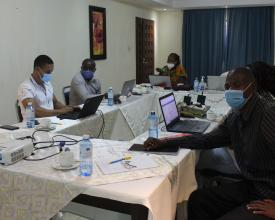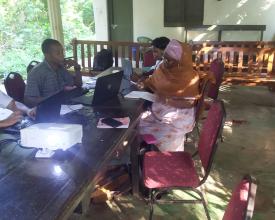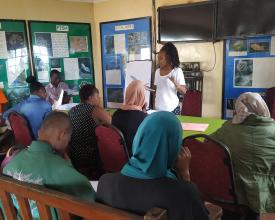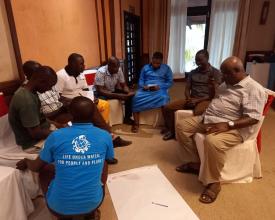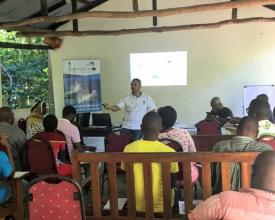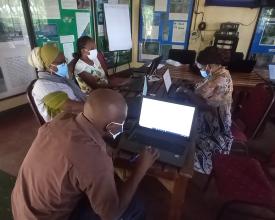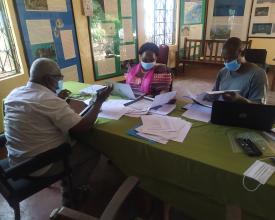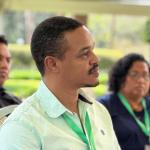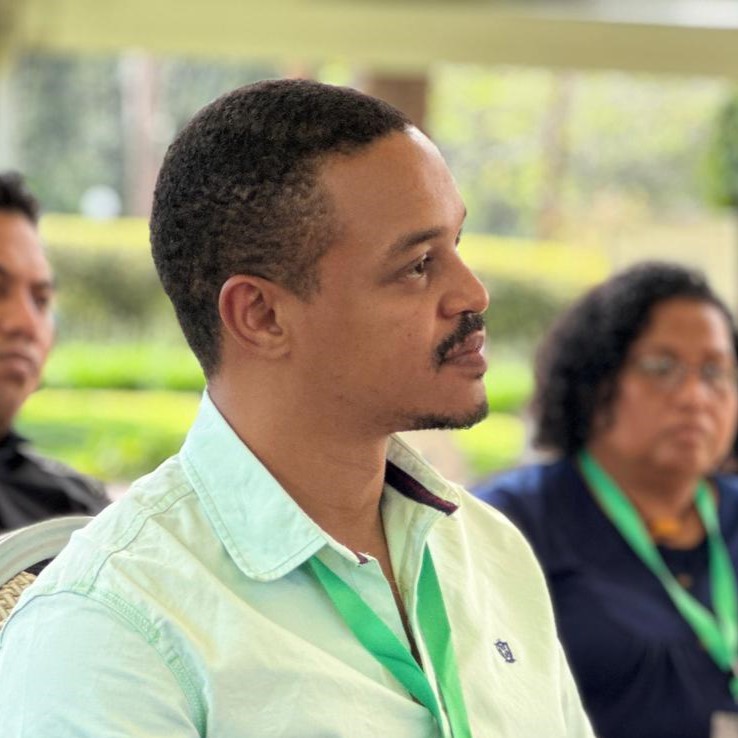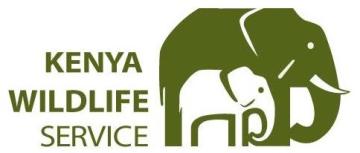
WIO-COMPAS Assessment: A Mentorship Approach Towards Building MPA Staff Capacity
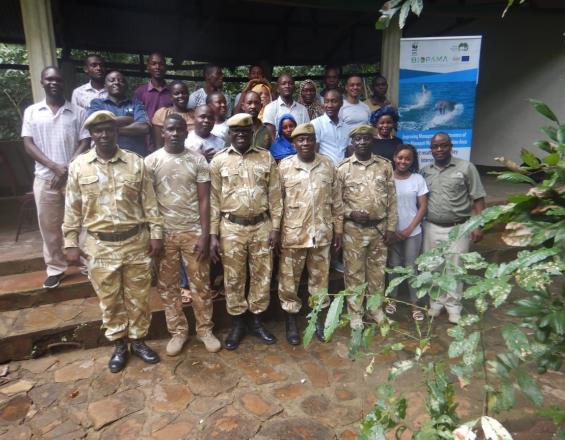
An adaptive approach was used to build the capacity of the Kisite Mpunguti MPA staff in preparation for the WIO-COMPAS assessment programme. This was necessitated by a persistently low understanding of the WIO-COMPAS programme following a single training session.
The approach entailed a refresher training followed by a tailored mentorship programme. Mentors were selected from among the MPA staff who were either already certified through WIO-COMPAS in the past or showed good understanding levels.
The mentors were tasked to support fellow staff to better understand the WIO-COMPAS programme and prepare accordingly for the assessment. As a result, around 15 MPA staff were certified in the WIO-COMPAS assessment.
A key learning point from this solution is that a one-off training was insufficient to ensure that all the necessary skills are absorbed. A constant and readily-available support system is necessary to ensure that this objective is achieved.
Contexte
Challenges addressed
Following the initial training, the staff were then given a month to prepare their portfolios, aligned to the seven competence areas, for the WIO-COMPAS assessment. However, only a few complied. This was owing to the following challenges:
- Low literacy among MPA staff: A lot of rangers were unable to express themselves through writing. Additionally, most of the staff had limited computer literacy skills and had issues finalizing the WIO-COMPAS assessment application online.
- Experience was mostly for terrestrial PAs, rather than marine: A large number of the staff were transferred in from terrestrial PAs. As such, they had limited understanding over the local oceanography and biodiversity basics.
- Split focus among other work-related priorities: The nature of MPA work requires that the staff work beyond normal working hours. This made it difficult for the staff to focus fully on the WIO-COMPAS portfolios.
Emplacement
Traiter
Summary of the process
Three key building blocks needed to be in place before the capacity building for the MPA staff could commence.
Firstly, it was necessary to ensure that good functional relations were in place for WWF-Kenya to work with the KWS and WRTI (Block 1). This would ensure support for initiatives, not just at the grassroots, but also at the national level. This also opens up opportunities for replication to other MPAs.
Secondly, it was necessary to identify the gaps in management effectiveness (Block 2). This would help guide the direction of the capacity building exercise by enhancing focus on the identified gaps.
Thirdly, it was necessary to identify the experts that would facilitate the development of the training programme and conduct the actual training and mentorship exercises (Block 3). This is built on the foundation set by the first two blocks.
Combined, these provide all the elements necessary to facilitate the preparation of the MPA staff to engage in the WIO-COMPAS assessment.
Building Blocks
Good Relations with the Mandated Management Institution of the MPA
The management of the Kisite Mpunguti MPA is mandated to the Kenya Wildlife Service and the Wildlife Research and Training Institute. It was therefore critical to have buy-in from the managers of these institutions in the implementation of project activities including WIO-COMPAS. This ensured the endorsement of the WIO-COMPAS programme and its subsequent recognition for career development.
For this reason, the two institutions were included in the process from inception to completion. This ensured the MPA staff that this venture would add value, at individual levels, to their careers, and not just to the MPA management. This was crucial, as the WIO-COMPAS assessment preparation process is quite daunting, and a motivating factor is necessary to ensure their participation.
Enabling factors
Long-standing history with the management institutions: WWF-Kenya has long-standing good relations with the two institutions, having worked closely together on multiple projects over decades. Additionally, a Memorandum of Understanding is in place with the institutions because of this, making interactions seamless and cooperative. However, where such a history is not in place, good relations can still be fostered by establishing goodwill and through open and transparent collaboration.
Lesson learned
Identify a point-person: Though good relations may exist at higher management levels, it is necessary to have a point person at the MPA level to assist in overall planning and staff mobilization. It is an added bonus if that person has the expertise needed to assist in either the training phase, mentorship phase, or both. Where necessary, multiple point persons may be selected. For the case of the Kisite Mpunguti MPA, two staff were selected, including the warden from KWS and the Senior Researcher from WRTI, where both had expertise on the WIO-COMPAS programme.
Criteria for point-person selection: A criteria for the selection of the point person(s) is necessary to ensure smooth implementation. These include:
- Availablility and accessibility throughout the planning, training, mentorship phases of this capacity building
- Shown interest in the WIO-COMPAS programme
- Willingness to assist throughout the process.
Other criteria may be established at this point based on the local context.
Prior Assessments to Identify Capacity Gaps
While the WIO-COMPAS programme aims at improving the individual capacity of MPA professionals, it also has a compounding effect on the management effectiveness of an MPA. Therefore, a prior assessment on the different aspects of MPA management effectiveness is necessary for monitoring, evaluation, learning and adaptive management purposes.
It is thus recommended that the MPA implementing this process commences with at least one of the following assessments
-
Integrated Management Effectiveness Tool (IMET) or Management Effectiveness Tracking Tool (METT)
-
Social Assessment for Protected Areas (SAPA)
Combined, these highlight gaps in the different aspects of an MPA, including management, governance, ecological health, and social wellbeing. These gaps can be used to tailor the WIO-COMPAS training programme towards addressing the gaps identified.
Enabling factors
Institutional Recognition and Support: The institution managing the MPA must see the necessity of assessing the management status of MPAs. This will ensure appropriate funding allocation in the long term to facilitate the continual capacity growth of the MPA.
Capacity to Conduct the Assessments: Internal capacity is desired to reduce costs. However, external expertise may be sourced where necessary where capacity is lacking. This may include working with partner institutions on a pro bono basis or using a consultant to conduct the entire assessment.
Lesson learned
Prior planning: It is necessary to consider the entire process beforehand. This includes identifying the expertise/personnel needed, the duration for the exercise, and any costs associated with it. Additionally, it is important to allocate specific tasks to the individual assessment team members to ensure the objectives of the exercise are fully met in good time.
Public participation: Engaging the MPA staff alone in the assessments leads to positively skewed results. Consequently, it is necessary to acquire views from other stakeholders as well to get a more holistic picture of the management gaps that the MPA is facing. It will therefore be necessary to map out stakeholders, including their influence and interests in the MPA, before the assessments.
Expertise Necessary for the Capacity Building Process
The WIO-COMPAS programme arranges regional training sessions for their WIO-COMPAS programme. Where practical, the MPA staff may be facilitated to participate in this training. However, it is important to note that these training sessions may not be available at the time where staff capacity building is needed.
Where this is the case, a core team of local trainers may be established. The expertise presented by the trainers should be aligned with the seven core competence areas of the WIO-COMPAS programme. Preferably, internal expertise may be sourced from among MPA staff that have previously been certified and/or have a background in the competencies of focus. Where additional expertise is required, external partners may be included, or a consultant may be used. Alternatively, communication can be made to the WIO-COMPAS fraternity requesting for trainers to facilitate the training process.
After the training programme, it is necessary to select the trainees that showed the highest potential as mentors for the other MPA staff and assisting in the application process for the WIO-COMPAS certification. These mentors would also be contact persons for follow up and feedback to showcase progress in the assessment preparations.
Enabling factors
An understanding of the WIO-COMPAS Programme: It will be necessary for the lead team to become familiar with the WIO-COMPAS programme and its seven core competencies. This will allow for the identification of the internal/external experts that can facilitate the specific training sessions.
Familiarity with the gaps identified in the MPA assessment(s): This ties in with the second building block. The knowledge of the gaps facing the MPA will allow for the planning team to tailor the training towards the gaps identified in the prior assessments.
Lesson learned
Manage Expectations: Following the identification of the core team members, it is necessary to convene a meeting with them to establish a common ground. This includes the development of an understanding over the purpose and individual roles (linked to expertise) of the team members, and the development of terms of references to ensure accountability. Additionally, it is important to manage expectations at this point. Where team members external to the target institutions are selected, aspects of institutional recognition and facilitation should be agreed upon.
Centralized Planning: The training areas for the WIO-COMPAS are broad and technical. It will thus take time to develop the training materials. It may therefore be impractical for the trainers to develop the training materials in their own free time. A planning meeting is therefore necessary for the joint development, review and agreement on the training programme and materials. In the case where a previously certified MPA staff member has been pre-identified to become a mentor for the MPA team, he/she may also be involved in this meeting.
Impacts
On certification of the MPA staff through the WIO-COMPAS programme, following this mentorship approach, the MPA staff agree to adhere to professional standards and codes of ethics. In turn, this results to the following impacts:
-
Environmental benefits: By leveraging the capacity gleaned from this programme, the MPA staff are exposed to more career development prospects. This motivates them to exercise more diligence in their work, thereby ensuring the conservation objectives of the MPA are met. Additionally, certified staff are included in the WIO-COMPAS MPA Pro programme, which allows for lesson sharing and replication throughout the WIO region.
-
Socio-economic benefits: The programme stresses the need for community participation in MPA governance and management. By imparting these values to the MPA staff, this ensures that the local communities have a say towards the planning and implementation of MPA management plans, thereby safeguarding their own social and economic values while ensuring inclusivity and proper sharing of benefits from the MPA.
Beneficiaries
Direct and indirect beneficiaries are realized through this mentorship approach.
Direct beneficiaries include the staff managing the MPA. Indirect beneficiaries include the fisher communities in the nearby villages.
